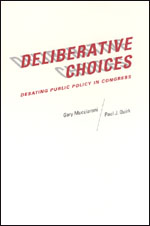Debating the stimulus
 As U.S. senators continue to debate the economic stimulus package on which they could vote as early as tonight, their deliberation over such a huge bill heightens the implications of the questions Gary Mucciaroni and Paul Quirk pose in Deliberative Choices: Debating Public Policy in Congress. Does debate genuinely inform members of Congress and the public? Or does it mostly mislead and manipulate them?
As U.S. senators continue to debate the economic stimulus package on which they could vote as early as tonight, their deliberation over such a huge bill heightens the implications of the questions Gary Mucciaroni and Paul Quirk pose in Deliberative Choices: Debating Public Policy in Congress. Does debate genuinely inform members of Congress and the public? Or does it mostly mislead and manipulate them?
Mucciaroni and Quirk argue that in fashioning the claims they use in debate, legislators make a strategic trade-off between boosting their rhetorical force and ensuring their ability to withstand scrutiny. They show how legislators’ varying responses to such a trade-off shape the issues they focus on, the claims they make, and the information they provide in support of those claims.
Mucciaroni and Quirk conclude that congressional debate generally is only moderately realistic and informed. It often trades in half-truths, omissions, and sometimes even outright falsehoods. Yet some debates are highly informative. We can only hope today’s will fall into this last category. But in any case, it’s always possible to improve deliberation, and the authors recommend reforms designed to do so.